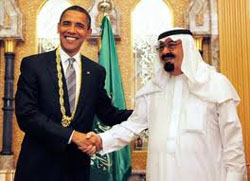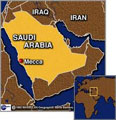| NSPM in English | |||
The Sum of All Fears |
 |
 |
 |
| четвртак, 17. март 2011. | |
|
(The National Interest, March 17, 2011)
Since 1945, Washington has championed, funded (through oil purchases), and defended the Arab Peninsula’s tyrannies. It has backed the Sunni regimes’ suppression of Islamist firebrands, and those governments, in turn, defused some anti-regime ire among their senior clerics and militant Islamists by suppressing the hated Shia minority even more brutally. The 2009-10 slaughter of Shia Huthi tribesmen in Yemen by the U.S.-trained and/or -armed forces of Riyadh and Sanna reveals the Sunni regimes’ attitude toward Shia. In effect, Saudi Arabia and Yemen did to the Huthis what Gaddafi today is doing to Libyan rebels, though the Libyans are better armed. -- Question: Why the differing U.S. and Western reactions to the two events? -- Answer: (a) Washington needs Saudi oil and Riyadh’s purchases of U.S. debt, and (b) Washington and its allies need Salih's regime to fight al-Qaeda in Yemen. In short, A + B = Destruction of the Huthi minority with the silent acquiescence -- nay, silent approval -- of the virtuous Western advocates of freedom strugglers in Egypt, Libya, and Tunisia.
After watching Washington and its allies give Iraq to the Shia; stand aside as Shia and pro-Shia politicians gain power in Lebanon; and encourage Bahraini Shia to revolt, the Saudis and their Gulf Cooperation Council (GCC) partners decided to try to stop the Washington-led wrecking of their security. Riyadh and the UAE sent about 2,000 troops to Bahrain this week. They have already broken up Shia demonstrations, killing several and wounding many. The Saudi-led GCC seems ready to kill as many Bahraini Shia as needed to maintain Bahrain’s Sunni regime. What is it that motivates Riyadh and its GCC sidekicks but seems to escape the U.S. and Western democracy cheerleaders? Well, try these for starters:
These, to say the least, are compelling motivations for the Saudi-led GCC to use military forces to stop a Shia takeover of Bahrain. If the GCC undertakes lengthy military action, the Saudis and their partners may well drag the United States into the conflict via the blank-check war commitment Washington gave Riyadh long ago when it decided to protect the Saudi tyranny in return for easy, inexpensive access to oil. U.S. military involvement in Bahrain also is likely because Saudi armed forces, though armed with hundreds of billions of dollars of U.S.-made arms, are near-to hapless. There is every chance the Saudis, without U.S. help, could be stymied or even beaten by Bahraini Shia fighters. And, as icing on the Saudis' cake, violence in Bahrain would prompt Israel and its U.S.-citizen lobby to press Obama’s administration to help the Sunnis -- whom they hate, but less than Iran -- against those they will call "Iran-backed Shia Bahraini terrorists."
Compared to these potentialities, Gaddafi's survival in Libya is small beer. What is now simmering in Bahrain is capable of repaying Washington‘s interventionism with a disaster amounting to what Tom Clancy once called "the sum of all fears." Michael Scheuer spent twenty-two years in the CIA and is the author of Imperial Hubris: Why the West is Losing the War on Terrorism (Potomac Books, 2004) and Through Our Enemies' Eyes: Osama Bin Laden, Radical Islam, and the Future of the United States (Potomac Books, 2002). His latest book is Osama Bin Laden (Oxford University Press, February 2011). |
Од истог аутора
Остали чланци у рубрици
- Playing With Fire in Ukraine
- Kosovo as a res extra commercium and the alchemy of colonization
- The Balkans XX years after NATO aggression: the case of the Republic of Srpska – past, present and future
- Из архиве - Remarks Before the Foreign Affairs Committee of the European Parliament
- Dysfunction in the Balkans - Can the Post-Yugoslav Settlement Survive?
- Serbia’s latest would-be savior is a modernizer, a strongman - or both
- Why the Ukraine Crisis Is the West’s Fault
- The Ghosts of World War I Circle over Ukraine
- Nato's action plan in Ukraine is right out of Dr Strangelove
- Why Yanukovych Said No to Europe

.jpg)








 With the West focused on Libya, Egypt, and Yemen, it may be in tiny Bahrain where Washington pays the piper for 35 years of intervention in the Arab world. A prolonged Sunni-Shia shooting war in Bahrain would make other regional events pale in importance to the United States and the West. Bahrain could well be the place where the world as we know it ends.
With the West focused on Libya, Egypt, and Yemen, it may be in tiny Bahrain where Washington pays the piper for 35 years of intervention in the Arab world. A prolonged Sunni-Shia shooting war in Bahrain would make other regional events pale in importance to the United States and the West. Bahrain could well be the place where the world as we know it ends. There was almost no regional impact from the Sunnis' vicious hunting of Yemen’s minority Huthis. But in Bahrain, the Shias are the long-oppressed and discriminated-against majority. Having seen Shia Bahrainis in Manama’s streets for more than a month trying to overthrow a Sunni monarchy, Western journalists and politicians -- most recently, Secretary Clinton on 15 March -- have cheered on the Shia, apparently not realizing the West’s Arab Peninsula Sunni “allies” will not, indeed, cannot tolerate the creation of a Shia regime on the peninsula.
There was almost no regional impact from the Sunnis' vicious hunting of Yemen’s minority Huthis. But in Bahrain, the Shias are the long-oppressed and discriminated-against majority. Having seen Shia Bahrainis in Manama’s streets for more than a month trying to overthrow a Sunni monarchy, Western journalists and politicians -- most recently, Secretary Clinton on 15 March -- have cheered on the Shia, apparently not realizing the West’s Arab Peninsula Sunni “allies” will not, indeed, cannot tolerate the creation of a Shia regime on the peninsula. Some may think this scenario far-fetched, but who would have: expected the U.S. military to lose the Afghan and Iraq wars; thought Mubarak and other Arab tyrants would be overthrown; or believed al-Qaeda and its allies would be a threat ten years after 9/11. As always, U.S. interventionism is self-defeating, but as Washington presides over lost wars, a crumbling, tyrant-based strategy in the Arab world, and a growing domestic Islamist threat, the worst may be yet to come. A Sunni-Shia civil war in Bahrain could well yield: U.S. military operations to save the weak Saudi army and secure the 5th Fleet's base; a Sunni-U.S. war with Iran; and, sky-rocketing oil prices and damaged production facilities.
Some may think this scenario far-fetched, but who would have: expected the U.S. military to lose the Afghan and Iraq wars; thought Mubarak and other Arab tyrants would be overthrown; or believed al-Qaeda and its allies would be a threat ten years after 9/11. As always, U.S. interventionism is self-defeating, but as Washington presides over lost wars, a crumbling, tyrant-based strategy in the Arab world, and a growing domestic Islamist threat, the worst may be yet to come. A Sunni-Shia civil war in Bahrain could well yield: U.S. military operations to save the weak Saudi army and secure the 5th Fleet's base; a Sunni-U.S. war with Iran; and, sky-rocketing oil prices and damaged production facilities.












